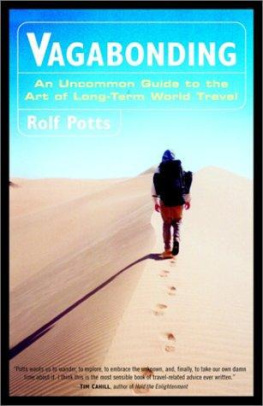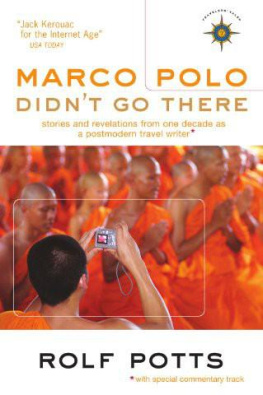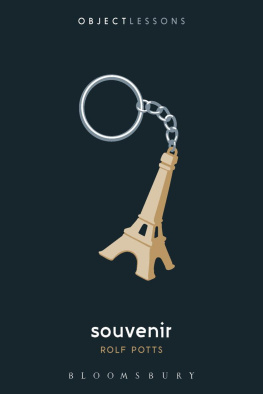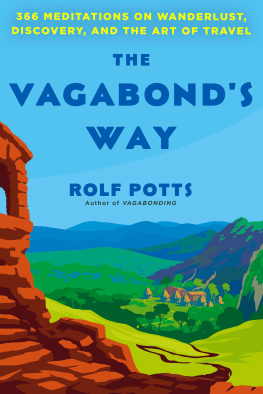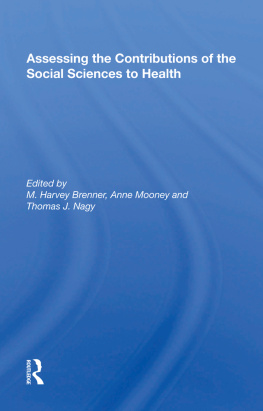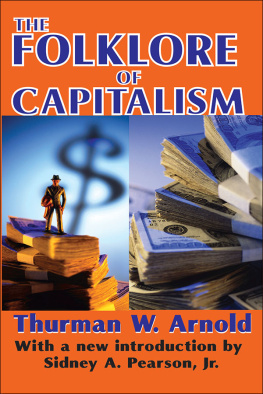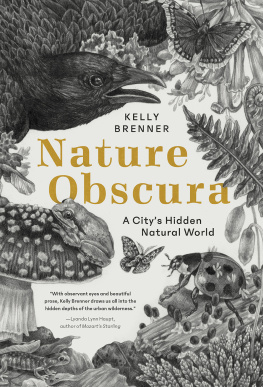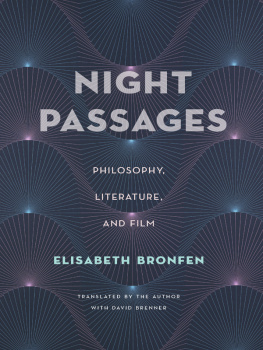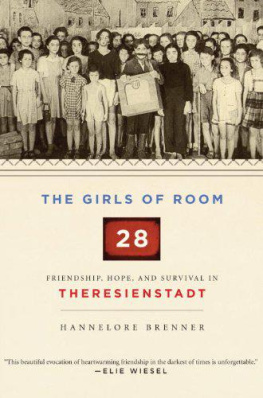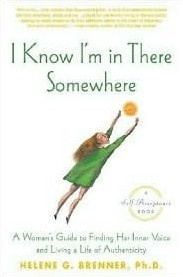Vagabonding:
An Uncommon Guide to the Art of Long-Term World Travel
Rolf Potts
For two teachers:
GEORGE D. POTTS, prairie naturalist and dreamer extraordinaire
And in memory of JOHN FREDIN, mentor and friend (1930-2000)
You air that serves me breath to speak!
You objects that call from diffusion my meanings and give them shape!
You that wraps me and all things in delicate equible showers!
You paths worn in irregular hollows by the roadsides!
I believe you are latent with unseen existences, you are so dear to me.
- WALT WHITMAN, SONG OF THE OPEN ROAD
Vagabonding- n.
(1) The act of leaving behind the orderly world to travel independently for an extended period of time.
(2) A privately meaningful manner of travel that emphasizes creativity, adventure, awareness, simplicity, discovery, independence, realism, self-reliance, and the growth of the spirit.
(3) A deliberate way of living that makes freedom to travel possible.
Preface
HOW TO USE THIS BOOK
M any travel books can help prepare you for an overseas trip, but this book - in sharing a simple and time-honored ethic - can teach you how to travel for the rest of your life. Some books, in offering encyclopedic (and often redundant) travel information, create the illusion that the best way to plan for an extended trip is to micromanage it. This book, in offering you only the advice you need to prepare for (and adapt to) the road, encourages you to enrich your travels with the vivid joys of uncertainty. And while some travel books become obsolete after one reading, this book will shed new perspectives and resonate in new ways as your travel career progresses.
This book views long-term travel not as an escape but as an adventure and a passion - a way of overcoming your fears and living life to the fullest. In reading it, you will find out how to gain an impressive wealth (of travel time) through simplicity. You will find out how to discover and deal with new experiences and adventures on the road. And, as much as anything, you will find out how to travel the world on your own terms, by overcoming the myths and pretentions that threaten to cheapen your experience.
If youve ever felt the urge to travel for extended periods of time but arent sure how to find the time and freedom to do it, this is the book for you. If youve traveled before but felt something vital was missing from the experience, this book is for you, too.
This book is not for daredevils and thrill seekers but for anyone willing to make an uncommon choice that allows for weeks and months at a time, improvising (and saving money) as you go.
If this sounds like an intriguing possibility, then by all means read on
INTRODUCTION
All I mark as my own you shall offset it with your own,
Else it were time lost listening to me.
- WALT WHITMAN, SONG OF MYSELF
How to Win and Influence Yourself
Not so long ago, as I was taking a slow, decrepit old mail steamer down Burmas Irrawaddy River, I ran out of things to read. When the riverboat called at a small town called Pyay, I dashed ashore and bought the only English-language book I could find for sale: a beat-up copy of Dale Carnegies How to Win Friends and Influence People, which I proceeded to read as we slowly steamed toward Rangoon.
Somehow, Id gone through my entire life without ever having read a self-help book. Carnegies advice, as it turned out, was a charming mix of common sense (be a good listener), good advice (show respect for the other mans opinions), and antique notions (dont forget how profoundly women are interested in clothes). Having enjoyed the book on the river, I gave it away in Rangoon and temporarily forgot about it.
About a month later, I was approached to write a book about the art and attitude of long-term travel. Since Id primarily been endorsing this vagabonding ethic through the narrative stories Id written for Salon.com, I figured I should probably do some research into the structure and format of advice books. Thus, in the process of trying to relocate a copy of How to Win Friends and Influence People, I discovered that the advice and self-help book market has changed a lot since Carnegies day. Nearly every human activity, desire, and demographic, it seems, is now catered to by some kind of inspirational book. The Chicken Soup for the Soul and Dont Sweat the Small Stuff series by themselves nearly required their own section of the bookstore.
Standing there amid the shelves - and bewildered at the variety - I began to imagine a vagabonding publishing empire: not just Vagabonding, but Vagabonding for Teens. Vagabonding for Singles. Vagabonding for Golfers. Vagabonding Your Wardrobe. The Ten-Week Vagabonding Diet. A Vagabonding Christmas. A Babys First Vagabonding. 101 Zesty Vagabonding Recipes. All I Ever Really Needed to Know I Learned While Vagabonding. And so on.
In the end, I left the bookstore without picking up a single book. I decided that I would write the book the only way I knew how: from experience, from passion, and from common sense.
If at times this book seems unorthodox, well, good. Vagabonding itself is unorthodox.
As for the word vagabonding, I used to think it was my own invention. This was back in 1998, when I was first pitching an adventure travel column to Salon.com. At the time, I wanted a succinct word to describe what I was doing: leaving the ordered world to travel on the cheap for an extended period of time. Backpacking seemed too vague a description, globe-trotting sounded too pretentious, and touring rang a bit lame. Consequently, I put a playful spin on the word vagabond - the old, Latin-derived term that refers to a wanderer with no fixed home - and came up with vagabonding.
Id almost convinced myself that Id given hip new phrasing to a certain attitude of travel when I discovered a dog-eared paperback entitled Vagabonding in Europe and North Africa on the shelf of a used bookstore in Tel Aviv. Written by an American named Ed Buryn, the book had not only been published before my travel column hit the Internet but had been written before I was born. And in spite of its occasional hippie-era phrasing (avoid your travel agent like he was the cops and go out to find out about the world by yourself), I found Vagabonding in Europe and North Africa to be a fine collection of advice, a levelheaded and insightful pre-Lonely Planet take on the nuts, bolts, and philosophy of independent travel. Consequently, discovering Ed Buryns book was not discouraging so much as it was liberating: It made me realize that, whatever name you give it, the act of vagabonding is not an isolated trend so much as it is (to crib a Greil Marcus phrase) a spectral connection between people long separated by place and time, but somehow speaking the same language.
I have since seen reference to the word vagabonding as early as 1871 (in Mark Twains Roughing It), but Ive never found it in any dictionary. In a way, its a kind of nonsense word - playfully adapted to describe a travel phenomenon that was already out there when Walt Whitman wrote, I or you pocketless of a dime may purchase the pick of the earth.
Thus, a part of me wants to keep the notion of vagabonding partly rooted in nonsense: as indeterminate, slightly slippery, and open to interpretation as the travel experience itself.
So, as you prepare to read the book, just keep in mind what martial arts master Bruce Lee said: Research your own experiences for the truth Absorb what is useful Add what is specifically your own The creating individual is more than any style or system.
On the road, the same holds true for vagabonding.
PART I
Vagabonding
CHAPTER 1
From this hour I ordain myself loosd of limits and imaginary lines,
Going where I list, my own master total and absolute,
Next page
